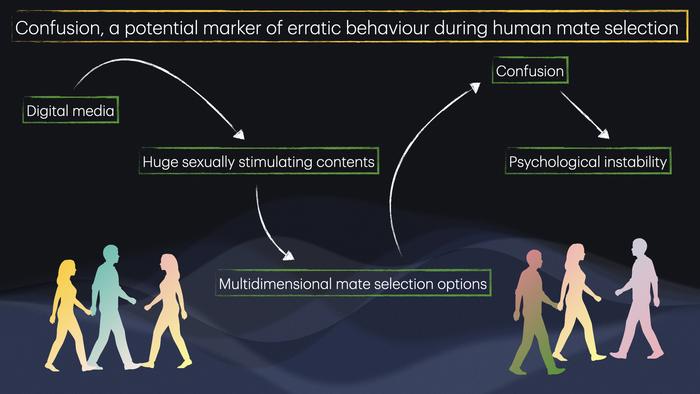A recent sociological study finds that most young adults surveyed reported feeling confused about their options when it comes to dating decisions. Preliminary analysis suggests that more than half of young people experience confusion about choosing life-partners, with women appearing to be more likely to report partner selection confusion than men.

Credit: Chayan Munshi
A recent sociological study finds that most young adults surveyed reported feeling confused about their options when it comes to dating decisions. Preliminary analysis suggests that more than half of young people experience confusion about choosing life-partners, with women appearing to be more likely to report partner selection confusion than men.
Due to the pervasiveness of social media and digital dating in everyday lives, humans are now exposed to many more potential mates than ever before, but the availability of popular dating apps and ease of photo enhancement can distort the reality of the available pool of dating candidates.
“Human mate selection is a complicated psychological process, which is effectively influenced by multiple societal factors including appearance, personality and financial situation,” says Chayan Munshi, Founder and Executive Director of the Ethophilia Research Foundation in Santiniketan, India. “More recently, this has become significantly influenced by social media where constant exposure to sexually stimulating or attractive content creates certain perceptions of reality in the young mindset, which ultimately creates confusion in terms of selecting potential mating partners.”
The Ethophilia Research Foundation is a research group focused on behavioural biology research and public health, who have recently started to investigate how the digitalisation of society is regulating human behaviour. “This project started with extensive observation of human behavioural patterns regarding partner choice,” says Mr Munshi. “This observational study was followed by direct interactions with a young population using an open questionnaire.”
The preliminary results of this ongoing project come from a survey of young adults in India, with most respondents being between 18 and 30 years old. Further analysis of the results is underway, with an expanded survey in preparation to include more specific lines of inquiry.
The questionnaire included questions related to romantic partner selection, such as “Do you feel confused when selecting a life-partner?”, “What are your criteria for selecting a life-partner?”, “Do you still look for other partners if you are already in a stable relationship?” and “Do you like to switch to a ‘better option’ when selecting a life-partner?”.
These initial results show that the perception of potential mate availability may be skewing how people judge their life-partner options, even while in existing relationships. “For instance, impulsiveness is significantly exhibited, and there is a decrease in in-person social interactions,” says Mr Munshi. “This is exposing confusion while people search for a mating partner and can manifest complexities in maintaining a relationship.”
Mr Munshi expects that this ongoing research will help to build a better understanding of how mate selection is evolving in humans. “Our hypothesis strongly indicates that the ‘pleasure index’ or ‘adrenaline rush’ of relationships is taking more prime importance in the younger generation over long-term stability,” he says. “It is alarming that impulsiveness or confusion can lead to instability in the human relation-maintaining behaviour, which is actually affecting the normal social behaviour in humans.”
“The pattern now is notable enough to indicate that this might modify the social norms of partner choice behaviour in young humans, which might have significant effect on the brain-behaviour circuit,” says Mr Munshi. “In the long run, this may eventually alterthe fundamental protocol of evolutionary mating strategies.”
This research is being presented at the Society for Experimental Biology Annual Conference in Prague on the 2-5th July 2024.



